

GROWING OUR FUTURE




Lubbock - Cooper FFA Member Turns Family Cookie Recipe Into A Thriving Baking Business
Holland FFA Member Uses Agriscience Research To Drive Innovation In Agriculture Two Chapters, One Purpose
Convention Planning Tips
V.R. Eaton FFA Member Builds Lawn Care Business From The Ground Up
Overton FFA Member Uses Therapy Technology To Improve Livestock Health And Performance
24-25 Ford Leadership Scholars Projects Advisor End of Summer Check-List
Panhandle FFA Member Embraces Generational Family Farm Legacy
Stephenville FFA Member Researches Swine Equipment Sanitation Products
FROM THE EDITOR

“Doing to Learn.” To me, the second phrase of the FFA motto really embodies the essence of agricultural science education.
We incorporate hands-on learning and practical application into every aspect of our programs. Learning doesn't stop at the textbook. Our students experience real-world situations that allow them to take concepts from the classroom and turn them into tangible skills.
We do this because it is a proven learning method. One that cultivates critical thinking and helps students retain information by doing rather than just observing. It’s this kind of experiential learning that sets agricultural science education apart and prepares students for careers in agriculture and beyond.
As you read through this issue, you’ll find inspiring stories of students and educators who are living proof that “Doing to Learn” builds not only skillsets—but strong character and lasting confidence.
We hope you enjoy the Summer 2025 issue of Growing Our Future!
Ashley Dunkerley
Grants are open to:
Certified, active 9th-12th grade teachers in a Texas public school or accredited non-public secondary educational institution who address ag mechanics, metal technologies, ag structures design/fabrication, ag equipment design/fabrication or agricultural power systems TEKS.
Apply by Aug. 1, 2025


Marcus Hill, Ag Workers chairman of the board, announces Jessica Reeves will be joining the board of directors. With 24 years of experience as an ag teacher, Jessica brings a wealth of knowledge and a strong dedication to agricultural education. We are proud to have her represent both ag science teachers and our policyowners, and we look forward to the fresh perspectives she will bring to the board!
BY: MARK MCCLURE
BEYOND THE CLASSROOM
HOW CTE AND FFA BUILD FUTURES
I’ll tell anyone within earshot that agriculture science classes and the FFA set my life on a path to success. Some might say I didn’t have a choice but to enroll once I entered high school, considering my dad was one of the teachers, but the truth is, it wasn’t a second thought. I grew up in the ag building, playing with tools and "helping" train teams. From a young age, I noticed something special about the students involved in these programs. They were different—transformed through their hard work and dedication. It was the kind of difference I admired, the kind I wanted to emulate.
My high school years were filled with athletic and FFA practices, but I always knew the FFA was teaching me valuable life lessons that would take me places. After seeing the profound impact that agriculture science and the FFA had on students, I knew I wanted to follow that same path and help shape the future by becoming an ag science teacher.
In 2001, after finishing my studies at Tarleton, I landed a job in Waxahachie. I continued to witness firsthand how this organization positively influenced students' lives. After six years, an incredible opportunity arose—one that allowed me to return home to Cleburne to continue making a difference. I taught there for five years before making a difficult decision to leave the classroom for a new role. The FFA had taught me to step outside my comfort zone, so I took a leap and became an assistant princi-
“AFTER SEEING THE PROFOUND IMPACT THAT AGRICULTURE SCIENCE AND THE FFA HAD ON STUDENTS, I KNEW I WANTED TO FOLLOW THAT SAME PATH AND HELP SHAPE THE FUTURE BY BECOMING AN AG SCIENCE TEACHER."
“THE FFA TAUGHT ME INVALUABLE LESSONS THAT HAVE SHAPED ME THROUGHOUT MY LIFE—HARD WORK, PASSION, LEADERSHIP, PUBLIC SPEAKING, RESPONSIBILITY, AND TEAMWORK, TO NAME JUST A FEW."
pal at Cleburne High School.
For the next four years, I worked closely with the Career and Technical Education (CTE) department, which expanded my perspective beyond agriculture science and opened my eyes to the power of CTE across all programs of study. In 2016, I landed my dream job as the Director of CTE for Cleburne ISD. For eight years, I served in this capacity, and I saw how CTE and Career and Technical Student Organizations (CTSO) were transforming students' lives in ways I had never imagined. I was proud to debunk the misconception that CTE is only for a specific group of students, and over those years, CTE enrollment ballooned to 98% of the student body.
In July 2023, I was hired as the Assistant Superintendent of Student Services for Cleburne ISD, and as you might expect, I continue to work with CTE, albeit a little more distant. I’ve always said that Career and Technical Education prepares students for their next first step, whether that leads them to college or directly into the workforce. It gives students a chance to find their passion and jumpstart their careers. When students graduate as program completers, armed with an industry-based certification, they don’t just have a diploma—they have a clear direction for their future.
CTE programs save time and money by helping students focus on a career path
they’re passionate about, rather than spending years dabbling in different majors or career fields. All Career and Technical Student Organizations teach skills that are transferable to any career, making students more adaptable and competitive.
The FFA taught me invaluable lessons that have shaped me throughout my life—hard work, passion, leadership, public speaking, responsibility, and teamwork, to name just a few. I spent more time with my agriculture science teachers than with any other district employees, and through those relationships, I saw firsthand what a difference passionate educators can make. They taught me that to be better than average, you must push the envelope. My dad’s favorite quote was, “Hard work beats talent when talent doesn’t work hard.” It’s a lesson that has stuck with me my whole life.
I am deeply grateful for the foundation I received through the agriculture science program. It helped shape me into the person I am today. To any student, I encourage you to find something in CTE that you’re passionate about. It will give you something to get up for every day, and the lessons you learn will stay with you for the rest of your life. It will make you a better individual, a more capable professional, and a stronger member of society.
“I AM DEEPLY GRATEFUL FOR THE FOUNDATION I RECEIVED THROUGH THE AGRICULTURE SCIENCE PROGRAM. IT HELPED SHAPE ME INTO THE PERSON I AM TODAY."
2025 INDUCTEES
The Agriculture Teachers Association of Texas Hall of Fame exists to recognize and honor agricultural science teachers whose careers, achievements, and contributions stand exemplary. Inductees are known as well-rounded professionals that have proven their success with FFA activities, in the classroom, as well as community involvement. They have proven their desire to provide students with opportunities for premier leadership, personal growth and career success over a significant period of time.












































For Tatum Westbrook, a Lubbock-Cooper FFA member, what started as a family tradition has grown into a successful business focused on custom cookies and baked goods.
“I started by helping my grandma bake cookies, cakes, and brownies,” Westbrook shared. “Her sugar cookie recipe has been passed down for generations, and now I get to carry that on.”
After learning the recipe and practicing at home, she began baking independently. Encouraged by feedback from family and friends, she decided to turn her hobby into a business—bringing her grandmother's famous cookies to the Lubbock area.
From managing inventory and finances to promoting her cookies on social media, she’s grown her customer base.
TEXAS FFA'S STAR CHAPTER AGRIBUSINES
LUBBOCK - COOPER FFA MEMBER TURNS FAMILY COOKIE RECIPE INTO A THRIVING BAKING BUSINESS
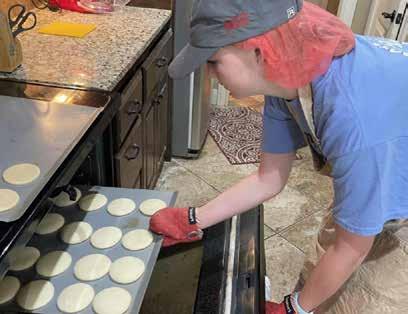
“It started by word of mouth,” said Westbrook. “But once I started using social media, everything took off. I’ve had to learn how to keep up with demand, balance my school schedule, and still ensure every order is high quality.”
Her FFA network has been a key part of that growth. By connecting with fellow members, teachers, and families through FFA events, she found new customers and supporters who believed in her business.
“I never expected a family recipe to turn into something this rewarding,” Westbrook said. “It’s shown me what I’m capable of and how FFA can help turn a passion into a purpose.”





New teachers enter ing any discipline in the public schools of Te x as face many challenges. A beginning agr iculture teacher has a regular educator ’ s responsibilities, as well as managing an FFA program, livestock show and project center responsibilities, booster clubs, and many competitive leadership and judging activities. The Agr iculture Teachers Association has established a professional mentorship program. The program includes careful selection of the mentors and mentees through an application process, where new teachers indicate their interests and areas of need

New teachers participating in the program have access to our mentor’s combined experience of over 400 years of agriculture education experience, and the following benefits:
• ON-SITE CLASSROOM AND FACILITY VISITS
• YEAR-ROUND COMMUNICATION
• FACILITATION OF MEETINGS WITH ADMINISTRATION
• INDIVIDUALIZED SUPPORT

IF YOU ARE A BEGINNING AGRICULTURE TEACHER AND WOULD LIKE TO TAKE ADVANTAGE OF THIS PROGRAM, PLEASE COMPLETE YOUR APPLICATION BY AUGUST 1, 2025
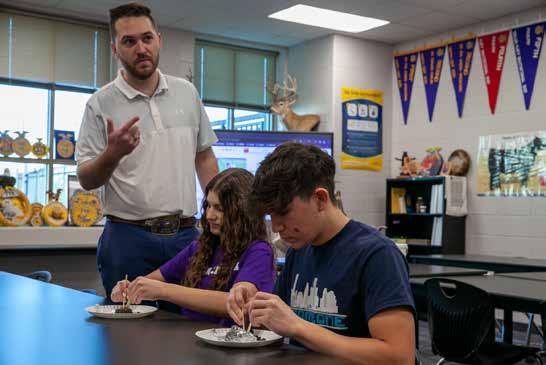


With a passion for solving real-world problems in agriculture, James Steglich, a Holland FFA member, is exploring both plant science and mechanical systems.
From fertilizer alternatives to torque efficiency, the high school student’s research spans multiple disciplines with one goal in mind—improving the sustainability and profitability of production agriculture.
"Each project was about finding a way to make agriculture better, whether through improving crop yields or increasing equipment efficiency,” Steglich said. “Research has given me the tools to explore solutions that could help producers like my own family."
The journey started with a simple question, how can farmers cut input costs without losing performance? This led to research using
STAR LONE STAR AGRISCIENCE
HOLLAND FFA MEMBER USES AGRISCIENCE RESEARCH TO DRIVE INNOVATION IN AGRICULTURE

fish emulsion as an alternative to synthetic fertilizers.
"I’ve learned how to set up experiments correctly, how to write research papers, and how to communicate complex ideas clearly,” Steglich said. “These skills will help me in college, my career, and back home on the farm.”
He also evaluated the impact of socket extensions and adapters on torque efficiency.
“Research has allowed me to explore areas of agriculture I care deeply about,” Steglich said. “Whether it’s helping farmers save money or giving them better tools, I know my work is making an impact.”

Each year, a Texas and New Mexico FFA chapter come together for an event that’s about more than just raising funds—it’s a celebration of community, tradition, and investing in the future of agriculture.
The Wilbur-Ellis Auction, an annual event named after its longtime sponsor, has been a cherished tradition for the Texico and Farwell FFA chapters since 1996. Bringing together students, families, and businesses from both sides of the state's borders. The event serves as a powerful reminder of how an agricultural community can rally behind its youth.
“The amount of support we receive is very humbling,” said Sid Morris, Farwell FFA Advisor. “It is cool to see two chapters from two states that are simply divided by a railroad track use the same organization to develop students. Both communities
TWO CHAPTERS, ONE PURPOSE TEXICO AND
FARWELL FFA
CHAPTERS COME TOGETHER FOR ANNUAL AUCTION

"THE
WILBUR-ELLIS AUCTION, AN ANNUAL EVENT NAMED AFTER ITS LONGTIME SPONSOR, HAS BEEN A CHERISHED TRADITION FOR THE TEXICO AND FARWELL FFA CHAPTERS SINCE 1996."
"IT’S ABOUT PROVIDING STUDENTS WITH THE RESOURCES AND EXPERIENCES THEY NEED TO GROW INTO CONFIDENT LEADERS AND SKILLED PROFESSIONALS IN THE AGRICULTURAL INDUSTRY."
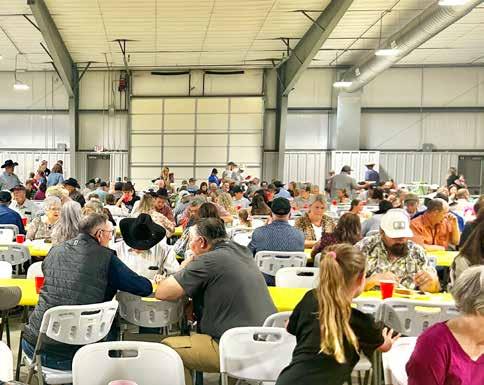
believe in our kids and the importance of FFA.”
In the weeks leading up to the auction, FFA members from both chapters go out into their communities, collecting donated items ranging from handmade projects and farm supplies to high-end coolers, gift baskets, and vacation packages. Sponsors and supporters are then invited to gather for an evening of generosity, complete with a barbecue dinner provided by Wilbur-Ellis, a local seed and fertilizer company.
"Besides the financial impact, It also helps students see how much community support plays in success," said Morris. "People that these students have never seen before show up to support and encourage them. One thing that never gets old is hearing everyone who comes to our auction and brag on the kids in their official dress."
The funds raised play a crucial role in ensuring that all students have access to the opportunities the programs provide. From covering the cost of FFA jackets to funding leadership conferences, competitions, and hands-on agricultural education experiences, the auction helps remove financial barriers for students pursuing their pas-
sions.
"This was our 30th year, and we reached the one million dollar mark," said Morris. "It is hard to fathom how many students over the past 30 years have been positively impacted by this event in various ways because of the generosity of so many people who believe in the value of the FFA.”
The impact of the auction goes far beyond the dollar amount raised each year. It’s about providing students with the resources and experiences they need to grow into confident leaders and skilled professionals in the agricultural industry.
Year after year, the auction proves that ag is more than just a way of life—it’s a community that stands together, lifting up the next generation.
"THE AUCTION PROVES THAT AG IS MORE THAN JUST A WAY OF LIFE—IT’S A COMMUNITY THAT STANDS TOGETHER, LIFTING UP THE NEXT GENERATION."













CONSIDER THESE ITEMS WHEN YOU ’ RE PLANNING YOUR CONVENTION TRIP

PLANNING TIPS PLANNING TIPS
SCHEDULE MEALS

SERVICE PROJECT
WORKSHOPS
CHAPTER PLANNING
DELEGATE INFORMATION

BANQUETS









LOCAL ATTRACTIONS

HOUSING STUDENT PACKING





SAFETY












CHECK IT OUT!
CONVENTON PIN CHALLANGE


FOLLOW US ON SOCIAL MEDIA
HEALTH AND SAFETY INFO

MAKE IT FUN























DELEGATE DELEGATE C N F M N







THE 2025 DELEGATE BUSINESS SESSION PACKET




DELEGATE ALLOCATION MEMO
SCAN TO VIEW ALL DELEGATE DOCUMENTS












FFA FRIDAY TEACHER RESOURCE
Week 1
Week 2
Week 3
Week 4
Week 5
Week 6
Week 7
Week 8
Week 9
Week 10
Week 11
Week 12
Week 13
Week 14
Week 15
Week 16
Week 17
Week 18
Week 19
Week 20
• Discuss the significance of agriculture. (What Does Agriculture Mean?)
• How does FFA contribute to agriculture?
• SAE Show and Tell
• Have experienced members discuss their SAE with classes. Have them bring in animals or items that assist in explaining their SAE.
• Explore the various SAE opportunities.
• AET Profile Set-up, AFNR Courses, and Resume
• Review the Various Types of SAEs
• Non-Traditional SAEs
• Introduce Leadership Development Opportunities
• Setting Up Your Experiences in AET
• Adding Expenses/Income to Your SAE
• Career/Personality Profile
• Students complete modules over SAE For All in order to develop their roadmap.
• Update Record Books
• Resume Development
• Writing A Cover Letter
• Mock Interviews
• Speech Writing
• Update Record Books
• Schedule a visit to a local elementary classroom to share an agricultural lesson and promote your FFA chapter.
• Present Speech to Class
• Plan Elementary Visit
• Present Speech to Class
• Update Record Books
• Introduce Career Development Events
• Update Record Books and Prepare to Submit any Applications
130.2.(c) (4) (5)
130.2.(c) (2) (4) (5)
130.2. (c) (1) (2) (4) (5)
130.2. (c) (1) (2)
130.2. (c) (1) (2)
130.2. (c) (1) (5)
130.2. (c) (1) (5)
130.2. (c) (1) (2)
130.2. (c) (1) (2)
130.2. (c) (1) (2)
130.2. (c) (1) (2)
130.2. (c) (1) (2) (6) (9)
(c) (1) (2) (6) (9)
(c) (1) (2) (6) (9)
(c)
FFA FRIDAY ALLOWS TEACHERS TO SATISFY THE SAE/RECORD BOOK REQUIREMENT FOR COURSES WHILE ALSO CREATING LEARNING EXPERIENCES FROM STUDENTS THAT LIE WITHIN THE CORE OF THE 3-COMPONENT MODEL. LISTEN TO THE FFA UNRAVELED PODCAST EP. 7 FOR MORE FFA FRIDAY RESOURCES
(c) (1) (2) (5) (6) (9)
(c) (1) (2) (5) (6) (9)

STAR GREENHAND AGRIBUSINESS
V.R. EATON FFA MEMBER
BUILDS
LAWN CARE BUSINESS FROM THE GROUND UP
For Cole Bolton, a V.R. Eaton FFA member, what began as a simple neighborhood project in fourth grade has grown into a thriving lawn care and landscaping business.
The now high school student operates his own lawn care service that includes seven consistent lawn care clients and around five customers for tree trimming and landscape work.
“I started small with just mowing and installing a few plants,” Bolton shared. “As I gained experience and built trust, I was able to take on bigger jobs.”
Along the way, he repaired equipment himself, built a custom trailer to transport tools, and learned new skills like irrigation repair, hedge trimming, and calculating tree fall angles.
One of the biggest challenges was competing with

larger companies. “It’s just me, and I only work after school and on weekends,” said Bolton. “But I’ve learned to stand out by being reliable and producing quality work.”
Looking ahead, he plans to continue growing the business, and possibly hire help, as the client list expands.
“This experience has taught me the value of hard work and responsibility,” Bolton said. “It’s shown me how agriculture can be hands-on, rewarding, and impactful in any community.”

TEXAS FFA'S STAR LONE STAR AGRIBUSINESS
OVERTON FFA MEMBER USES THERAPY TECHNOLOGY TO IMPROVE LIVESTOCK HEALTH AND PERFORMANCE
For Vance Aaron, an Overton FFA member, an interest in animal health has grown into a thriving business. As the owner of AFL Livestock Solutions, the high school student uses Pulsed Electromagnetic Field (PEMF) therapy to reduce pain and inflammation in show animals.
“I started in 2020 by assisting my dad with treatments and studying training materials,” Aaron said. “Over the years, I’ve treated over 595 animals and grown a client list of more than 100.”
The business uses a specialized machine called the Julian Duo. To become a certified technician, he completed online coursework through the MagnaWave company. The technology delivers targeted pulses that stimulate muscles and improve circulation, allowing animals to recover from stress or injury.

“I begin each session with a full-body treatment using the XL wave wings or large loop,” Aaron said. “Then I focus on specific problem areas, like swollen hocks, lymph nodes, or sore pads.
It’s amazing to watch the muscles twitch and loosen as the PEMF effect kicks in.”
While he treats a variety of species, swine have remained a core focus. In addition, he has remained competitive through continued education, trial treatments on their own livestock, and carefully documented results.
“I’ve treated animals that went on to win major breed or division championships and place in county sales,” Aaron said. “Each success is proof that these treatments work, and that my business is making a difference.”
2025 2025
AGRICULTURE TEACHERS ASSOCIATION OF TEXAS
SCHOLARSHIP
RECIPIENTS
CALEB ANDERSON
ETHAN BARRETT
YANCEY BEAN
TYLER BILLINGS
CALY BLACKSHER
LAYNIE BOYD
ELIZABETH BROWN
REVEN BRUMMOND
BRAYSON BURCH
CUTTER BURKHALTER
LILLIAN BURNETT
CAITLYN CARDENAS
KALE COX
CAMRYN CRADDOCK
EMILY DENNY
TREVOR DEVROW
ELLIOTT GIL
MACY GILLILAND
TY GLOVER
CADEN HARREL
QUINN HARTLEY
MACYN HICKS
JACE JONES
KALE JONES
KAYZEN LASSERE
TYLER LIERE
KIMBER LINKE
LANDON LOERWALD
BROOKLYNN MARTIN
TATE MATTHEWS
RHYDER MATTHIES
MATTHEW MCCULLOUGH
JANTSEN MORRIS
TANNER MORRIS
MCKYLA MYERS
ADDISON REED
TERRELL REED
KIMBERLY RODRIGUEZ
MASON ROEDER
TRISTAN ROGERS
LYDIA SCHERTZ
LANE SCHULZ
WADE SOUTHERN
SAM STANLEY
STEVEN STEGALL
JAMES STEGLICH
TAIDEN THIEL
MACKENZIE THOMASON
AIDEN WALKER
EMILY WILCOXSON
TYNLEA WILSON
MADISON WOOD
ABBEY JO WOHLEB


Every year, ten deserving students are selected to join the Ford Leadership Scholars Program. During the student's senior year of high school, the FFA members commit to a hands-on leadership program and complete year-long substantial and sustainable service capstone projects.
Let's take a look at the class of 2024-2025's projects.
ALLIE CADDELL STAMFORD FFA
“Pursuing the People,” involved building a pickleball court at Harmon Park in Stamford, Texas, to foster community connection. With concrete poured in March, surfacing completed in April, sponsor benches built by Stamford FFA, and a community clean-up day held in May, Caddell believed, “a shared space can create shared purpose.”

CORA FORD
WESLACO FFA

“Cowboy Corners,” created outdoor wellness spaces with gardens, art, and inspirational features across three Weslaco ISD campuses, funded by Board Trustee Benjamin Castillo. With accessibility upgrades like a wheelchair ramp at Central Middle School and help from FFA members during May planting days, Ford said, “We created a space where every student felt seen, supported, and connected to something bigger than themselves.”
SYDNEY HERRING
CINCO RANCH FFA
“A Touch of Hope,” aimed to provide swing sets to children battling cancer through partnerships with the Snowdrop Foundation and local FFA chapters. Exceeding her original goal of ten, she gave a swing set to every family that applied and helped collect over 1,000 items for Texas Children’s Hospital, saying, “Even the smallest act of kindness can bring comfort and hope to someone facing their hardest days.”

MADISON MCCLURE
CLEBURNE FFA

“First Responders First,” aimed to support dispatcher mental health by transforming the Johnson County dispatch center courtyard into a peaceful retreat. Unveiled during Dispatcher Awareness Week, the space featured custom benches, rocking chairs, and thoughtful décor, with McClure saying, “Dispatchers are often the unseen heroes—this space was a reminder that their service mattered every single day.”
CIARA HAYS
LLANO FFA
“The B.U.D. Initiative,” aimed to ensure everyone in her community felt seen and supported through monthly efforts addressing suicide awareness, sexual assault prevention, and school staff appreciation. Using podcasts, resources, and student involvement, she also planned to focus on professionalism, food insecurity, and mental health, saying, “Even if you help just one person, that’s one more person than before—and that matters.”
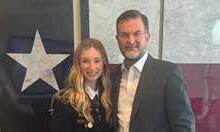
HANNAH GRIFFICE
GOOSE CREEK MEMORIAL FFA

“Table Tales,” aimed to boost agricultural literacy through interactive restaurant placemats and teacher resources. Partnering with local businesses and Texas Farm Bureau, she expanded the project to reach families and educators across GCCISD, saying, “When we made agriculture fun and accessible, we planted the seeds of understanding in the next generation.”
AMARACHI UCHE-EBOH
TALKINGTON FFA
“Food Drives Up North,” was a student-led food delivery program serving northeast Lubbock. Partnering with local organizations, the project delivered over 85 food items to more than 20 households and engaged over 10 students, with Uche-Eboh saying, “Connecting youth with service creates lasting impact—one drive at a time.”

CODY GONZALES
DEER PARK FFA

“Agriculture is for All,” aimed to bring hands-on ag education to urban students. He hosted an Urban Agriculture Day and built a greenhouse and hydroponic gardens at Deer Park ISD’s Outdoor Learning Center, reaching all K–5 students, saying, “When students experienced agriculture firsthand, they realized it truly was for everyone.”
JORDAN VANWINKLE
SULPHUR SPRINGS FFA
“The Leaf & Light Laboratory,” was a greenhouse initiative that taught incarcerated women in Hopkins County sustainable agriculture and life skills. With support from local partners, the program used aquaponics, aeroponics, and educational tools to promote growth and rehabilitation, with VanWinkle saying, “This project was about more than plants—it was about second chances and changing lives.”

SARAH BECK
CORSICANA FFA

“Restock and Refresh,” included a hygiene closet providing free essentials to students in need. After collecting over 500 items, she expanded the project to offer pre-packed kits for both the high school and middle school, saying, “Every student deserved to feel confident and cared for—sometimes, that started with the basics.”
END OF SUMMER CHECKLIST

For Samuel Weinheimer, a Panhandle FFA member and fourth-generation farmer, the family business is far more than an after-school activity, it’s a way of life. The high school student has logged over 700 hours working on Weinheimer Farms, a nearly 10,000-acre cotton, milo, and wheat operation in the Texas Panhandle.
“I started operating equipment when I was just 10 years old,” Weinheimer said. “By age 12, I was moving cotton bales and helping scout fields with my dad. Since then, I’ve only added more responsibilities.”
Throughout the seasons, his duties shift with the needs of the farm. In the summer, he scouts crops for pests and assists with wheat harvest. Fall means operating a grain cart and running a cotton stripper. Winter brings time to repair equipment and improve fa-
TEXAS FFA'S STAR CHAPTER PLACEMENT
PANHANDLE FFA MEMBER EMBRACES GENERATIONAL FAMILY
FARM LEGACY

cilities. However, in 2023, he took on his most advanced role yet, operating the CS770 cotton stripper.
“Getting to operate the CS770 was a big accomplishment,” Weinheimer shared. “After watching the cotton grow all year, it’s really rewarding to be trusted with such an important job during harvest.”
This high-tech machine, responsible for stripping and baling cotton simultaneously, requires focus and skill. He monitors three screens and five cameras to ensure every round module meets quality standards.
“Farming is challenging, but it’s also one of the most rewarding things I’ve ever done,” Weinheimer said. “Being a part of FFA and working on our family farm has taught me not just how to be a better farmer, but how to be a better leader, too.”

TEXAS FFA'S STAR GREENHAND AGRISCIENCE
STEPHENVILLE FFA MEMBER RESEARCHES SWINE EQUIPMENT SANITATION PRODUCTS
For Hudson Musick, a Stephenville FFA member, a simple research question turned into a full-scale agricultural experiment focused on improving animal health and safety.
He explored the effectiveness of three cleaning agents on removing bacteria from swine feeders. Those cleaners included KennelSol Cleaner and Disinfectant, Nature’s Miracle Surface Cleaner, and Barn & Stable Sanitizer.
“I wanted to find out which cleaner worked best, not just for the sake of the project, but to help improve sanitation practices in livestock operations,” Musick said.
Using petri dishes, sterile swabs, and a controlled experimental area marked on each feeder, Musick collected bacteria samples before and after applying treatments. He incubated

the petri dishes in a dark, warm space for three days, then photographed and counted bacterial colonies.
His results showed that Nature’s Miracle was the most effective, with an average reduction of 1,087 colonies. KennelSol followed with 578, and Barn & Stable with 427. Statistical analysis confirmed that all treatments significantly reduced bacteria, validating the reliability of his data.
“One of my biggest challenges was making sure I collected accurate data,” Musick explained. “I had to think through every detail of my process to ensure my results were valid.”
What began as a learning experience turned into a project of personal growth. Over time, Musick shifted from asking his mentors for guidance to making independent decisions about procedures, treatments, and timelines.
AGRICULTURE EDUCATION RESOURCES TEACHER RESOURCE
CREATING A CULTURE OF DOING: CLASSROOM MANAGEMENT FOR HANDS-ON SUCCESS
BY: MICHELLE VASBINDER PROFESSIONAL DEVELOPMENT COORDINATOR AGRICULTURE TEACHERS ASSOCIATION OF TEXAS
In the agricultural science classroom, hands-on learning is essential. Whether it's testing soil samples, building irrigation models, or designing a mini hydroponics system, students thrive when they learn by doing. However, without solid classroom management, such dynamic lessons can quickly become chaotic.
Creating a classroom where students actively learn and stay on task requires intentional structure, smart systems, and a positive culture. Below are practical strategies for managing materials, time, and student behavior while maintaining the energy and creativity of hands-on agricultural education.
MANAGE MATERIALS WITH SYSTEMS, NOT STRESS
Set up your space like a lab or workshop-organized, labeled, and accessible. Go through the motions of your students and create a flow, imagine the lines at a theme park in one way out another, when gathering materials having groups clash only creates chaos and distractions. Consider creating table supplies or stations and keeping students in their groups. Designate group or student roles for set up and clean up. Keep inventory checklists in stations and teach students how to restock and report missing items. Ultimately, structured environments with clear routines reduce cognitive load, allowing students to focus more effectively on learning tasks.
TIME IS A TOOL, USE IT WISELY
Start by structuring hands-on lessons with clear time blocks. Set a visible countdown
timer and build this into your presentation. Students see a reminder of time for tasks encourages them to remain on task and helps you keep on track. Build in "reset time" at the end of the lesson 5 minutes to clean up and return materials. Predictable classroom routines can help to create a sense of calm and order and ease some students' anxiety and related behaviors.
SET CLEAR EXPECTATIONS FOR BEHAVIOR AND MOVEMENT
In active classrooms, rules must be visual, consistent, and practiced. Post and review "Lab Norms" regularly. Expectations should be reminded frequently through the lab or project. Practice routines like getting materials or transitioning between tasks before real labs begin. Reinforce positive behavior with praise, privileges, or points tied to teamwork and safety. Use a "Safety Contract" that students and guardians sign, keep these accessible to document frequent breaking of rules to discuss with parents and administrators. When it is easily accessible it is easier to document. Overall routines promote self-regulation and self-control as they provide students with a framework for managing their actions and emotions through tasks.
KEEP MINDS ENGAGED TO PREVENT OFF-TASK BEHAVIOR
Idle time causes problems, keep everyone doing something. When students have nothing to do what they find to do is never
productive and almost always destructive. Provide differentiated tasks for fast-finishers: journal reflections, sketching equipment diagrams, mini-research prompts, assisting others or yourself. For students waiting their turn, assign data recording, observation tasks, or peer coaching roles. Incorporate checklists or exit slips so students reflect on what they accomplished. Active learning strategies, such as hands-on activities, have been shown to increase not only student engagement but also understanding.
BUILD A CULTURE OF RESPECT AND RESPONSIBILITY
Hands-on learning thrives in a community where students feel trusted and accountable. Let students collaborate on classroom norms and hold each other accountable. Celebrate "Doing it Right" with shoutouts or highlight boards. Involve students in problem-solving. When something
goes wrong, ask, "What would you do differently next time?" Reflecting together often opens the door to a more in-depth understanding of the lesson and the establishment of a cooperative community. Establishing routines and a positive classroom culture will contribute to a sense of order and respect among students.
CREATING A CULTURE OF DOING
Creating a productive, hands-on agricultural science classroom is more than just managing materials; it's about cultivating a culture. When students know what is expected, have clear roles, and are excited to contribute, the classroom becomes a place of active exploration, not chaos. By blending structure with flexibility and order with curiosity, teachers can harness the power of "learning by doing" to its full potential, preparing students not just for tests but for life beyond the classroom.

new teacher reception
Monday, July 21, 2025
6:30 pm - 7:15 pm Omni Corpus Christi - Nueces Room


tag to teach ag
As your year comes to an end, we would love to connect with your students who are considering becoming Agricultural Science Teachers. If this career is in their “top five” career choices, we ask that you tag them to teach ag by entering their information in the QR code.
Thank you to the CHS Foundation for making Teach Ag Texas teacher recruitment and retention initiatives possible.



mentor, motivate, make a difference
KELSEY SNYDER
Axtell FFA
“I chose to become an ag teacher because of the influential people who helped shape me into the person I am today. Their guidance inspired me to give back and support the next generation. Agriculture education offers students valuable opportunities to grow, earn scholarships, and pursue higher education, and I’m passionate about helping them achieve that.”

what’s your

AG TEACHER BRAGS
KASSIE LOE HUGHES SPRINGS
ISD
"Kassie always has the student's best interest at heart and puts her all into her work! Every student loves having Mrs. Loe as a teacher and speaks highly of her at every opportunity!"
SUBMITTED BY: MADELINE MCNEIL
MARC NOLAN PALMER ISD
"Marc is the epitome of what it means to be an ag teacher in every sense of the title. He goes above and beyond to give every student the opportunity to participate in our program and to find ways each student fits. He has some of the most inventive ideas and is always willing to assist me in building or making things for the barn that will enhance our students' experiences."
SUBMITTED BY: RYAN VINES
MORGAN KIZZIAH FOSTER ISD
"Morgan goes above and beyond for our ag students. She travels far and wide to ensure they have the representation they need and welcomes every student into her heart."
SUBMITTED BY: REBECCA MEYER
HUNTER PARROTT
LUBBOCK - COOPER ISD
"Hunter is one of the most successful middle school ag teachers in the state. He has helped kids advance to nationals in the agriscience fair for the past four straight years at Laura Bush Middle School."
SUBMITTED BY: BLAKE VINEYARD
BUILDING MORE THAN PROGRAMS
BY: TOBY LONG PRESIDENT OF THE AGRICULTURE TEACHERS ASSOCIATION OF TEXAS AND HAMILTON HIGH SCHOOL AGRICULTURE SCIENCE TEACHER
Therewere over 80 job postings on the ATAT Careers website the last time I checked. When I, and many others from my graduating class, started our careers back in 1996, there were far fewer opportunities available. We applied for positions in the general areas where we wanted to be. They might not have been the highest paying or offered the best facilities or benefits, but we were simply grateful to land that first job.
Back then, things like school trucks, school farms, extended contracts, or stipends weren’t common for ag teachers. Today, those resources are much more accessible. On top of that, there are more opportunities than ever before—not just for teachers, but for students as well.
It’s an exciting time to be an ag teacher in Texas!
One of the great things about our teaching field is that our students get hands-on experience. It’s so fitting that the first line of the FFA Motto is: “Learning to Do, Doing to Learn.”
When I was teaching ag mechanics classes, the hardest part was keeping students in the classroom long enough to teach them safety and the process before heading out to the shop. That was always a challenge! But it’s necessary—and it reflects the heart of what we do.
The Three-Component Model of Agricultural Education—classroom/laboratory instruction, Supervised Agricultural Experience (SAE), and the FFA—offers our students so many different ways to learn by doing. And we, as teachers, are the ones facilitating all of it.
What we accomplish every year as ag scien-

ce teachers still amazes me.
But it also makes me wonder: how did we get to where we are today?
Could it be that we as teachers have lived out that same motto—Learning to Do, Doing to Learn—throughout our entire careers?
Tarleton State University and my supervising teacher for student teaching, Roy Ritchie, did a great job preparing me to know where to look and how to find what I needed to teach. But looking back, I realize that in July of 1996, as a brand-new teacher, I didn’t know what I didn’t know.
Starting my career as the second teacher in what had previously been a one-teacher department at Hamilton was a huge advantage. Not having to carry the full weight of every duty and deadline on my own, while also learning and developing a new subject area, was crucial for my survival as a new teacher.
That’s why the ATAT Mentor Program is so important, especially for new teachers in single-teacher departments. Having someone to lean on, ask questions, and share the load can make all the difference in those early years.
As a new teacher, I was tasked with starting a horticulture program. The goal? Build a greenhouse and teach the full gamut of horticulture and landscape design classes. I’m not sure I’d even set foot in an actual greenhouse before! I remember thinking, this is going to be difficult. And if that wasn’t challenging enough, I was also handed a couple of junior high exploratory classes—just for good measure. You know… the typical seven preps in an eight-period day.
“COULD IT BE THAT WE AS TEACHERS HAVE LIVED OUT THAT SAME MOTTO—LEARNING TO DO, DOING TO LEARN— THROUGHOUT OUR ENTIRE CAREERS?"
At the time, our department had one classroom, one office, and a small shop—shared between two teachers. The conditions were far from ideal, but my teaching partner and our students were incredible. When you have the most important things—people who support you—you can handle just about anything.
We didn’t get a second classroom until five years later, when the new school was built. That second room included a computer lab, which has since been repurposed as a classroom for our third teacher who came on board later.
The students and I built the greenhouse ourselves. We ordered it from Stuppy, and while I wish I could remember what it cost back in 1996, I do remember how it arrived, on a truck, packed in cardboard boxes with two sets of blueprints. It was a daunting task, and I’ll admit, I had my doubts at times.
But through the construction process, the students and I learned a lot. When we ran into difficult parts, I reached out to folks in the community for help. Not only did this solve the problems we faced, but it also gave me the chance to meet and connect with new people in town.
That greenhouse we built together? It’s still in use today, 29 years later. It’s been renovated over the years due to storm damage and was recently rewired with new electrical components.
Something I find especially meaningful: one of the students who was most involved in the construction now owns his own construction company. He started out in metal buildings, then built his own home, and 13 years ago, he built mine as his second. Now, his kids are in our ag program. Talk about full circle.
Once the greenhouse was built, that’s when the real work began. There was so much to
learn about actually running a greenhouse. I quickly found out that, when it comes to certain plants, a greenhouse can be a lot like a dairy, you can’t leave it unattended for very long without facing some serious consequences!
Despite the challenges, I really enjoyed seeing the pride in my students when we held plant sales. The community always showed up to support them, and the students loved hearing the praise for their hard work.
I truly enjoyed teaching horticulture and landscape design, even though I haven’t taught those subjects in nearly 20 years. These days, I think I could attend a few workshops at the ATAT Conference and find that same enjoyment again.
Funny enough, Mr. Baize and I ended up trading career paths. I took over his ag mechanics classes, and he took over horticulture.
This began a new chapter of Learning to Do and Doing to Learn for me.
Hamilton FFA had outgrown our 16' bumper pull trailer, it just wasn’t big enough to haul all of our students' livestock projects to shows. We found ourselves relying on parents to haul projects for other exhibitors or borrowing trailers from folks in the community. It wasn’t sustainable.
So, I gathered all my information to justify the need for a larger trailer. When I brought it to our principal, he told me he didn’t think we could purchase a trailer with department funds—but we could buy the materials, and the students could build one. That wasn’t exactly the answer I was hoping for… but it opened the door to incredible opportunities for growth and student success.
To prepare, I attended a gooseneck trailer-building workshop hosted by Dr. Billy Harrell of Sam Houston State University. For those who didn’t have the privilege of knowing him, the late Dr. Harrell was truly the teacher's teacher, a pioneer in the development of ag mechanics project shows and the creation of the Tractor Technician Career Development Event. I consider myself fortunate to have attended his two-week ag mechanics short course and two of his trailer-building workshops.
Dr. Harrell was featured in many of the classic CEV videos on topics like oxy-fuel cutting, shop safety, and gooseneck trailer construction. Those videos were invaluable. We’d play the section that matched the part of the trailer we were building, and the students could see exactly what needed to be done and how to do it.
Before we began our first gooseneck trailer, I called Dr. Harrell. He encouraged us, told me not to hesitate to call if we needed help, and suggested we enter it in the Houston Ag Mechanics Show.
Dr. William “Billy” Harrell left a legacy that will stand the test of time. Thanks to his influence and vision, every major livestock show in Texas now hosts ag mechanics shows, and the quality and number of student projects continue to grow every single year.
While teaching agricultural mechanics, it’s only natural, and prudent, to train CDEs that align with your students’ curriculum. So I started asking fellow ag teachers about contests related to ag mech, and I was encouraged by Rick Elmore to train a Tractor Technician team. I’ll be honest, I had no prior knowledge of the contest. But I was assured that help was available. And help they did.
Now-retired ag teachers like Gerald Kelly from Abernathy, Don Henson from Goldthwaite, and of course, Rick Elmore, never kept secrets. They shared everything when it came to training a Tractor Tech team. I remember Rick once saying, “I’ll share everything I’ve learned with you. It’ll be up to you and your team to outwork us.”
I was in the bleachers the year Rick Elmore won the state championship in Tractor Tech in 2011 and then retired. The following year, in 2012, Rick, now serving as Superintendent of the Tractor Tech CDE, announced the results and handed the State Championship plaque to the Hamilton FFA team. That team would not have been there if it hadn’t been for his encouragement and willingness to help fellow ag teachers and Texas FFA chapters.
We went on to win the Ag Mechanics CDE the following year.
I spoke with Rick before writing this, and true to form, he shared that he’s still helping when asked.
The knowledge and support I received over the years from mentors like Rick, Gerald, and Don is something I’ll never take for granted. And I’ll gladly pay it forward. Whether it’s helping with livestock fitting, training a team, or writing an award or scholarship application, I know so many of my fellow ag teachers are just as willing to lend a hand. The great ag teachers of Texas are some of the most driven, talented, and hardest-working people you’ll ever meet. They are always Learning to Do and Doing to Learn.
What I hope to accomplish through this article is to encourage fellow ag teachers to embrace challenges and try new things, especially when it comes to meeting the needs of your students. The place you’re in right now may be your dream job, or it may be full of challenges. Either way, the good news is: there are more resources available to you now than ever before.
From curriculum and conference workshops to the support of our ATAT and Texas FFA staff, and mentors in your area—help is within reach. One of your most accessible resources is your ATAT board members themselves. The ATAT staff and Board of Directors, coupled with Texas FFA, make up one of the finest professional groups I’ve ever had the privilege of working with. They work tirelessly for us and for our students across classrooms all over the state.
Having served on the Board of Directors and in this role, I’ve gained a deeper understanding and even greater appreciation for the leadership of Team Ag Ed. It’s been an honor and a privilege to serve as your ATAT President this past year.
I encourage each of you to serve when and where you can. Whether that’s at the chapter, district, or state level, do what you can, when you can. And beyond our careers, I hope we continue to be great leaders in our homes, neighborhoods, churches, and communities.
“AND BEYOND OUR CAREERS, I HOPE WE CONTINUE TO BE GREAT LEADERS IN OUR HOMES, NEIGHBORHOODS, CHURCHES, AND COMMUNITIES."
THE BLESSING OF HARD WORK
BY: JENNIFER JACKSON TEXAS FFA ASSOCIATION EXECUTIVE DIRECTOR
“ Opportunity is often missed because it’s dressed in overalls and looks a lot like hard work.” That quote sticks with me, not just because it’s true, but because in agriculture, we see it lived out every single day.
There’s something sacred about hard work. It reveals character. It builds resilience. It shapes who we are. In FFA and agricultural education, we don’t just talk about the value of hard work, we teach it, we practice it, and we celebrate it.
One of the most potent lessons agriculture offers is this: hard work is a blessing. It’s not something to be avoided; it’s something to be thankful for. We are fortunate to work in an industry that feeds, fuels, and clothes the world. We’re even more fortunate to help students discover the rewards that come with putting in the effort.
I once had a student who, on paper, didn’t seem like the “typical” FFA kid. He was a powerhouse on the defensive line, a standout in powerlifting, and carried a lot of social capital in the hallways. But one ag mechanics class changed everything. He was hooked, completely captivated by the projects, the problem-solving, and the pride that comes from building something with your own two hands.
That one spark turned into a fire. He began attending meetings, joined a committee, and became a valuable member of

our chapter eventually serving as chapter president and district and area officer. He earned proficiencies at the state level, qualified for nationals, built some of the most impressive projects I’ve seen come out of a high school shop. The most important thing about Cody, though, was that he valued hard work, he honored his commitments, he was kind to everyone he met, and to me, he exemplifies what we hope all FFA members will become. Cody remains a powerful reminder that hard work opens doors, changes lives, and levels the playing field.
That’s the beauty of FFA, it teaches students that they can not because of who they are when they walk in the door, but because of what they’re willing to do once they’re here.
LEARNING BY DOING
FFA creates a space where learning doesn’t just happen behind a desk. Students lead chapter meetings, manage SAE projects, care for animals, plan events, and step into
"THAT’S THE BEAUTY OF FFA, IT TEACHES STUDENTS THAT THEY CAN NOT BECAUSE OF WHO THEY ARE WHEN THEY WALK IN THE DOOR, BUT BECAUSE OF WHAT THEY’RE WILLING TO DO ONCE THEY’RE HERE."
roles where real responsibility is expected and earned. Whether they’re preparing for a Career Development Event, volunteering in their community, or welding in the shop, they’re not just memorizing information. They’re solving problems, working as a team, and building confidence through action.
This is the power of hands-on learning. It’s practical. It’s meaningful. And it sticks.
GROUNDED IN GRIT
Agriculture has always been a grassroots industry built on early mornings, dirty boots, and doing the work even when no one is watching. FFA helps students internalize these values. They learn that showing up matters. Those results don’t come overnight. That there’s dignity in doing things the right way, even when it’s the hard way.
Those lessons become part of who they are. And they last far beyond the classroom.
CHARACTER OVER COMFORT
One of my favorite quotes is: “Hard work beats talent when talent doesn’t work.” Some students are naturally gifted, sure. But what separates the good from the great, on the field, in the classroom, or in the barn is work ethic, dedication, and persistence. These are traits that FFA helps students develop, regardless of their starting point and you get to help them develop those traits. Some may disagree but knowing that we have the ability to make that kind of difference is more important than any buckle, banner, or scholarship!
We don’t just raise future farmers, we grow future leaders, public servants, entrepreneurs, and educators. And it all starts with understanding that effort matters more than ease.
THE RIPPLE EFFECT
What students learn in our ag classrooms and FFA programs doesn’t stay there. It
"WHAT STUDENTS LEARN IN OUR AG CLASSROOMS AND FFA PROGRAMS DOESN’T STAY THERE. IT FOLLOWS THEM INTO CAREERS, FAMILIES, AND COMMUNITIES.."
follows them into careers, families, and communities. The leadership skills they practice now become the backbone of the businesses, farms, and initiatives they’ll lead tomorrow. Their willingness to serve, work hard, and grow is what sets them apart.
It’s easy to talk about how proud we are of our students and we should be. However, we should also take a moment to be proud of our industry. Proud of this work. Proud of the hands-on, heart-led, purpose-driven learning we get to be a part of every single day. After all, for over 100 years, our organization has had a reputation of producing the most capable, qualified, hardest working students of integrity!
We are blessed! Truly blessed, to be part of an industry that doesn’t shy away from hard work. One that rewards perseverance. One that invites everyone, regardless of background, to roll up their sleeves and make something meaningful happen.
Here’s to the overalls and the blazers.
Here’s to the dirt under the nails and the ink on the page.
Here’s to the early mornings, the late nights, and all the work in between.
And most of all, here’s to the students who are learning, by doing, that hard work really does pay off.
Stipend Recipients Spring Student Teachers 2025
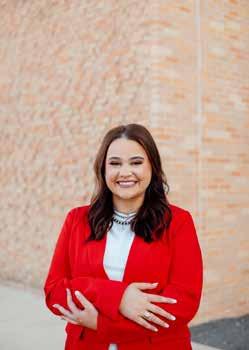


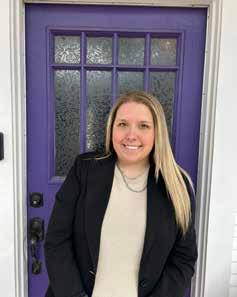









KENDYLL WILLIAMS
JULIA PALMER REESE REYNOLDS S ASHA PAT TERSON
KENNA LANE
ALYS A BROWN
ABBY KENJURA RACHEL RICHTER
OLIVIA DOYLE COOPER RAYL
JAMES BLANKENSHIP AMELIA CRUMM
AG MECH
S I M P L E P R O J E C T I D E A S



METAL HORSESHOE PROJECT
Students learn to use a wide range of tools from nail pullers to wire wheels They clean up the materials, weld the pieces together, and finish with paint It's a great, low-cost introduction to tool safety, shop procedures, and creative expression
"This year, I offered five design options that all used about the same number of horseshoes Ever y student loved it "
- Cassidy Steenbock, Burleson Centennial
FLOOR GRILL PROJECT
It's a simple but highly effective way to introduce shop safety, basic fabrication techniques, and precision in metalwork . Plus, they get to see a functional end product they built from the ground up which gives them a real sense of pride and accomplishment!
"Floor grills are great for freshmen They learn to measure, cut, notch, square, level, and weld "
- Jorge Gonzalez II, Roma

DRINK STAND PROJECT
The metal drink stand is a simple project. They learn how to clean up metal using a wire brush, tack weld pieces together securely, and finish it off with a clean coat of paint It ’s a quick, low-cost build that reinforces basic welding technique, sur face prep, and attention to detail
- Alan Linson, Ennis
NOT JUST DOING, DOING TO LEARN
BY: RAY PIENIAZEK
AGRICULTURE TEACHERS ASSOCIATION OF TEXAS EXECUTIVE DIRECTOR
I closed my spring article with a quote from Benjamin Franklin, "Tell me and I forget, teach me and I may remember, involve me and I learn." It felt right to open this summer article with the same quote, knowing our agriculture education model is based upon more than just what is taught through lesson plans. It is based on putting into practice what is learned in the classroom, whether in the FFA, an SAE, or the laboratory.
I have always believed you have to do things repeatedly to master them, and in many of my situations, you do not succeed the first time. As Richard Branson once said. "You learn by doing, and by falling over." We know this from the variety of opportunities we provide for our students to do what was learned.
Although I had many favorite classes while teaching, the woodworking class was one I loved over time; my students would take basic skills learned at the beginning of the year and grow in the types of projects they would take on. I remember one young man who brought wood pallets he wanted to take apart and build a project.
“I HAVE ALWAYS BELIEVED YOU HAVE TO DO THINGS REPEATEDLY TO MASTER THEM, AND IN MANY OF MY SITUATIONS, YOU DO NOT SUCCEED THE FIRST TIME."

He and I quickly learned why wood pallets stayed together: spiral-shanked nails. It challenged him to do things a bit differently in order to get them apart to create what he wanted. Ultimately, he overcame obstacles because he had to adapt to the situation. Doing this project helped him learn way more than just woodworking skills. He was learning life skills of patience, adaptability, and perseverance.
Aristotle said, "For the things we have to learn before we can do them, we learn by doing them." I think this quote fits my next favorite class to teach: food science and technology and meat processing. I have always loved eating, but preparing and processing the food product from the raw form is what I learned as a child. My grandfather always raised some hogs, and then we would process them in the winter. We got to help from the start to the finish. We learned which parts of the hog were valuable and used almost every item from the animal. I wanted to share what I got to do to learn with my students.
Most students had never done sausage-making, but I had been doing that all my life. We learned the value of using byproducts to increase the value of food and then got to put it into practice. By doing so, students could see processes used by past and present food processors. I love their facial expressions when I see some animal's intestines being filled with a meat product. I even allowed them to create a recipe to share with the class and take home to their families. Anytime they
“AS CTE TEACHERS, WE SHOULD ALWAYS STRIVE TO GIVE OUR STUDENTS HANDS-ON OPPORTUNITIES THAT WILL PROVIDE THEM WITH SKILLS FOR THE FUTURE."
could do something in the food lab, I felt like they were getting something out of my class.
As CTE teachers, we should always strive to give our students hands-on opportunities that will provide them with skills for the future. We always brag about being hands-on, but we know it takes a lot of work to make this happen. We are so fortunate to have classes that have essential knowledge and skills that can be hands-on. Be the teacher who makes sure actions are happening and shows your administrators and parents what agricultural science students are doing to learn.
I will close with another quote to remind us of the value of what we are doing. We are training the leaders of tomorrow. "Those people who develop the ability to continuously acquire new and better forms of knowledge that they can apply to both their work and their lives will be the movers and shakers in our society for the indefinite future." - Brian Tracy. I hope you have a fruitful and productive summer.
“BE THE TEACHER WHO MAKES SURE ACTIONS ARE HAPPENING AND SHOWS YOUR ADMINISTRATORS AND PARENTS WHAT AGRICULTURAL SCIENCE STUDENTS ARE DOING TO LEARN."
AN EXCERPT FROM A PAST AGRICULTURE TEACHERS ASSOCIATION OF TEXAS NEWSLETTER
80 THINKING PAST YEARS OF THE
THE DOINGS AND HAPPENINGS IN YOUR ASSOCIATION
May 1982
By: Jose Correa, Jr., VATAT President
"As this school year draws to a close, we want to say “thanks” for your support. Your professional association is a highly respected organization of dedicated individuals who work from sun-up to sunset to encourage and develop young people.
A strong professional association can only continue if its membership does it share. Professionalism is more than paying dues; it is more than attending a meeting or two each year. We must have sound programs with school and community support and student respectability. On behalf of the Board of Directors, may I express our most sincere thanks and appreciation for your support. Join us in a concerted effort to be better."








C O M M U N I C A T I O N I S K E Y
WITH A NEW YEAR ON THE HORIZON, MANY FACE MANY UNKNOWNS A NEW TEAM, NEW RESPONSIBILITIES, NEW ADMINISTRATION, ETC TO HAVE A SUCCESSFUL YEAR YOU MUST PLAN TO HAVE A SUCCESSFUL YEAR WHETHER YOU ARE A SINGLE TEACHER, HAVE A TEACHING PARTNER, OR HAVE EIGHT, YOU MUST DEVELOP SYSTEMS AND COMMUNICATE WITHIN YOUR TEAM WHEN YOU ASK A SUCCESSFUL TEAM WHAT THEIR SECRET IS, THEY ANSWER, “TEAMWORK MAKES THE DREAM WORK,” BUT COMMUNICATION IS KEY


TEAMING TASKS TO DO BEFORE THE NEW YEAR
What is your team's mission? What are your joint priorities? What will guide your decision-making? Outline these things so you have the same target.

Divide and conquer A detailed list of your program's responsibilities is needed The number one strain on a team is when individuals feel overworked, and tasks are unequal Seeing everything listed out and divided among teachers will help ensure equal workloads. It also provides a point of contact for things to the community.
List each month's happenings, what needs to be done, and what needs to be communicated. Creating a centralized program to-do list helps ensure nothing is missed, and everyone is on the same page.
Figure out the mode of communication that works for your group Is it a group text, email, or Google form? Find a way that works for all to stay in the loop about answers given to students, parents, and events that have happened.

FOR STEP BY STEP TO TAKE YOUR TEAM THROUGH FOLLOW UP HERE

DOING TO LEARN … THE APPLICATION
BY: AARON ALEJANDRO
TEXAS FFA FOUNDATION EXECUTIVE DIRECTOR
We have an FFA Motto, but they are just words unless applied. The application of the motto requires two important factors: 1) securing knowledge and skills and 2) applying and testing those skills. You become a stronger and more effective leader by actively engaging in the FFA Motto.
Applying information and knowledge is crucial, translating understanding into practical skills and real-world solutions. It reinforces learning, improves problem-solving, encourages critical thinking, and fosters adaptability, enabling us to contribute meaningfully to our business, professions, community, or organization.
"WE HAVE AN FFA MOTTO, BUT THEY ARE JUST WORDS UNLESS APPLIED."
Let's start with the basics. A recent visit to a prospective sponsor indicated she is more confident doing business with the Texas FFA Foundation because she was dealing with the organization's SME –Subject Matter Expert (SME). Forgive me for not knowing what this was right away, but you can rest assured I would find out. And, to my surprise, she was right; I was the SME. Just like if we have said or live by the FFA motto, we must be intentional about learning.
A subject matter expert - known as an SME - is an individual with a deeper un-
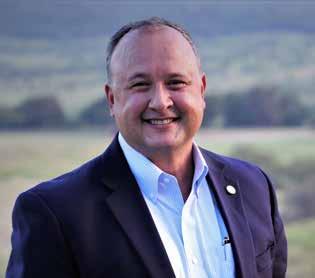
derstanding of an organization's process, function, technology, information, or equipment. Once identified as the SME, you may be sought out by others interested in learning more about or leveraging your unique expertise to solve problems, capitalize on opportunities, or help navigate an organizational challenge. Some SMEs can go on to serve as expert witnesses in lawsuits and other legal actions.
Interested? Here are some tips on "doing to learn." This is not a certificate you receive by "checking the boxes"… it takes time. Consistency creates credibility, which is true when being identified as an expert in a field. Be diligent and focused on becoming a credible voice for your business, organization, school, or community. Immerse yourself in best practices and learn from the best SMEs you can identify. You can pursue certifications and designations, and there are various online and university courses to assist your knowledge and leadership development.
Maintain a current and complete competency in their area of expertise. For the FFA student, be an expert in agriculture and leadership development. Educators focus on your profession, career and technical education, industry, community needs, and best practices in educating, encouraging, empowering, and equipping students for career success. Developing as a subject matter expert takes time, experience, and study. Mediocrity exists in many businesses and organizations. With
no desire to improve or become exceptional, they should hang a sign in their windows that read "No Worse Than the Competition." I encourage you not to become the generalists; become the experts; causes, like great businesses, need outstanding leaders. Leaders who are seen as experts.
"I ENCOURAGE YOU NOT TO BECOME THE GENERALISTS; BECOME THE EXPERTS; CAUSES, LIKE GREAT BUSINESSES, NEED OUTSTANDING LEADERS. LEADERS WHO ARE SEEN AS EXPERTS."
The heavy lifting is the time and grind to become the SME. Once there, you must maintain a level of excellence. At a recent John Maxwell seminar, it was said you should spend an hour a day on a topic or interest you are passionate about, and through diligent study, in five years, you'll become an expert. I believe, too, you must check this study with a little Zig Ziglar, "Go as far as you can see, and when you get there … you'll always be able to see farther"… don't stop learning … and applying what you've learned. In the words of Irvin Berlin, "The toughest thing about success is that you've got to keep on being a success." Here are a few tips on maintaining your passion for excellence.
Professional Networks. Connect with people who are passionate about learning more about a discipline. Idea exchange is a great way to learn, share, and create a sense of urgency and accountability.
Live Your Brand. Social media provides a unique platform to share content, opinions, and insights on topics associated with your expertise. A vibrant social media presence affords you the chance of third-party validation of the expertise you possess. [NOTE: My invitation to the Forbes Nonprofit Council resulted from my social media footprint. Living your brand
Stay Green. When you are green, you grow … when you are ripe, you rot. Always maintain a rookie mindset that there is always something else to learn. A mentor of mine once told me to have 10 friends older than me and 10 friends younger than me. One group will tell you where we've been, and the other will tell you where we are headed. This connection helps you stay hungry and want more knowledge.
As your expertise and brand grows, you may find yourself influencing others to engage with your knowledge, expertise, business, or organization. You may move from SME to influencer. In the words of Texas Workforce Commissioner Bryan Daniel, "Stop trying to become important, and work on becoming influential."
An influencer is an individual who has the power to affect the decisions of others because of his/her authority, knowledge, position, or relationship with his/her audience. In the world of education, agriculture, and leadership, we need you and others to be seen as experts, as influencers, who help their peers and community understand "the why" behind what we do and the incredible impact we have on Texas.
Time to apply the "Learning to Do."
"IN THE WORLD OF EDUCATION, AGRICULTURE, AND LEADERSHIP, WE NEED YOU AND OTHERS TO BE SEEN AS EXPERTS, AS INFLUENCERS, WHO HELP THEIR PEERS AND COMMUNITY UNDERSTAND "THE WHY" BEHIND WHAT WE DO AND THE INCREDIBLE IMPACT WE HAVE ON TEXAS."
GREETINGS FROM THE ASSOCIATION OF YOUNG FARMERS OF TEXAS
First and foremost, we invite everyone to join us in Marble Falls, Texas, January 8-10, 2026, to experience the agriculture industry in the Hill Country of Burnett County.
We are planning educational and fun tours for Friday and engaging presentations for Saturday. Keep up with our progress at www.txyoungfarmers.com and make plans to attend.
The Texas Young Farmer Scholarship Committee has recently selected our 2025 recipients from a large and highly qualified group of applicants. Our organization holds a soft spot for students attending a Texas college, university, or technical school to work toward a career in agriculture.
Our recipients include Brownsboro FFA's Libby Baker, who will attend Texas A&M University and major in animal science and pre-law, with aspirations of becoming an agriculture lawyer.
Next is Fairfield FFA's Cole Coufal, who will attend Texas A&M University and major in animal science with aspirations of pursuing a career in animal reproduction.
Lastly is Barbers Hill FFA's Dylan Biddy, who will attend Sam Houston State University as a track and field athlete and major in animal science and agribusiness with aspirations of pursuing a career in the business side of the animal industry.

All of our recipients come from highly active FFA chapters with outstanding Young Farmer Chapters that work to support the youth of their community.
Our scholarship committee looks at the applicants for Young Farmers activities, which support their chapters. These three students have helped their chapters orchestrate fundraisers such as Easter Egg My House, Porch Fries Stands, Turkey Classic Show, auctions, jackpot livestock shows and raffles. All to raise money to support their chapter members.
Congratulations to our scholarship recipients, and we hope to see you in Marble Falls this next January!


AG TEACHER TALK IS NOW A MONTHLY PODCAST! SCAN TO SUGGEST A TOPIC
These podcasts provide monthly discussions, professional development, association updates, and idea sharing to our members.

DOING TO LEARN WITH THE TEXAS FFA ALUMNI
BY: KELLY WHITE, TEXAS FFA ALUMNI PRESIDENT
“Tell me and I forget, teach me and I may remember, involve me and I learn.” - Benjamin Franklin
The first thought that came to my mind when I read the first line by one of our founding fathers, “Tell me, and I forget,” is the excuse I give my wife when she asks me to complete a “honey-do” around the house. How many of you are guilty of doing this? How often has one of your students told you, “I forgot,” after telling/asking them to do something? Or you create the best lesson of your teaching career for your evaluation; you feel that you nailed presenting it to your class - but as you wrap up and assess what your students learned, some were just not paying attention.
You begin to evaluate yourself, the lesson, the audience, and the subject. How could you have made this lesson better or something they could relate to? The answer? A lab or hands-on activity. “Involve me, and I learn” or “Doing to Learn.”
A well-planned hands-on activity turns passive listening into active engagement. It helps students connect the dots between concepts and real-world application. When we involve students in the process—when they do—they learn. That’s the power of agricultural education and the heart of what we do every day: bringing lessons to life through experience.
ALUMNI CHAPTER BASKET CONTEST
The basket with the most votes will receive the rotating “Basket Winner” trophy. The baskets become the property of the Texas
FFA Alumni Association and will be sold in our auction on Thursday evening.
Baskets need to be delivered to the Texas FFA Alumni booth in the exhibit hall by 4:00 p.m. on Tuesday.
The contest ends on Wednesday when the exhibit hall closes. The votes will be counted that evening.
A list of the items included should be clearly labeled on the basket.
The basket can be of any creation.
See you in Fort Worth at the State Convention!













LOBBYIST WORKING FOR INTEREST INVOLVING AGRICULTURAL SCIENCE EDUCATION AND RELATED TEACHERS
TIMELY LEGISLATIVE UPDATES CONCERNING AGRICULTURAL SCIENCE EDUCATION
ANNUAL PROFESSIONAL DEVELOPMENT CONFERENCE REGISTRATION FEE IS WAIVED
ACCESS TO LEGAL ASSISTANCE
ACCESS TO A $1 MILLION PROFESSIONAL LIABILITY INSURANCE POLICY
YEARLY SUBSCRIPTION TO THE ASSOCIATION’S QUARTERLY MAGAZINE, GROWING OUR FUTURE
ACCESS TO THE ASSOCIATION’S WEBSITE, INCLUDING THE CAREER PAGE
ACCESS TO THE ASSOCIATION’S ONLINE MEMBERSHIP DIRECTORY
ELIGIBILITY TO APPLY FOR THE ASSOCIATION’S STUDENT SCHOLARSHIP (MEMBER’S CHILDREN ONLY)
ELIGIBILITY TO APPLY FOR THE ASSOCIATION’S AWARDS AND RECOGNITION PROGRAM
ELIGIBILITY TO APPLY TO BE A PART OF THE ASSOCIATION’S PROFESSIONAL NEW TEACHER MENTORING PROGRAM
ELIGIBILITY TO PARTAKE IN THE KENNETH HUGHES LIFE INSURANCE PLAN
ACCESS TO THE ASSOCIATION’S AGRICULTURE SCIENCE TEACHERS CRISIS FUND
ACCESS TO THE VATAT CREDIT UNION
ACCESS TO A DISCOUNT AT WYNDHAM HOTELS NATIONWIDE
ACCESS TO THE AGRICULTURAL EDUCATION FORD TEXAS FFA LEADERSHIP CENTER FOR MEETINGS OR SMALL GATHERINGS

